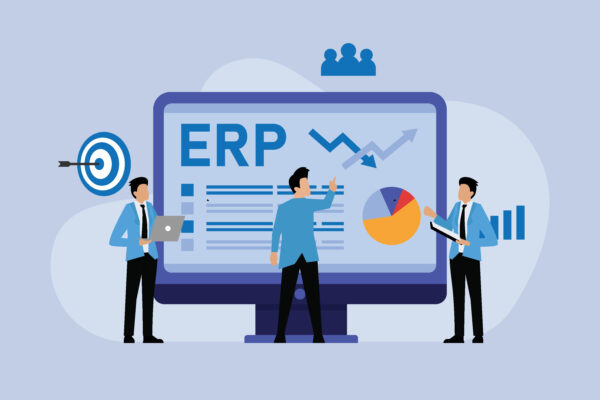Why ERP Stands Out: Unique Features Over Other Systems
In an era where businesses are inundated with data and operational complexities, the need for efficient management solutions has never been greater. Enter Enterprise Resource Planning (ERP) systems, designed to integrate and streamline various business processes into a unified framework.
Understanding the distinctive features of ERP systems is essential to appreciating their growing prominence over traditional software solutions. Unlike standard applications that operate in silos, ERP offers comprehensive integration capabilities, real-time data processing, and centralized data management, setting it apart as a powerful tool for organizations.
What is ERP?
 Enterprise Resource Planning (ERP) stands as a pivotal component in the technological framework that supports modern business operations. ERP systems are comprehensive software solutions designed to streamline and optimize core business processes such as finance, human resources, manufacturing, supply chain, and sales. By integrating these diverse functions into a single cohesive platform, businesses gain enhanced visibility and control over their operations. The essence of ERP lies in its ability to consolidate disparate data sources into one unified system, enabling real-time access, increased efficiency, and informed decision-making. As technology evolves, so too do ERP systems, now often equipped with advanced features such as built-in business intelligence and integrated machine learning capabilities.
Enterprise Resource Planning (ERP) stands as a pivotal component in the technological framework that supports modern business operations. ERP systems are comprehensive software solutions designed to streamline and optimize core business processes such as finance, human resources, manufacturing, supply chain, and sales. By integrating these diverse functions into a single cohesive platform, businesses gain enhanced visibility and control over their operations. The essence of ERP lies in its ability to consolidate disparate data sources into one unified system, enabling real-time access, increased efficiency, and informed decision-making. As technology evolves, so too do ERP systems, now often equipped with advanced features such as built-in business intelligence and integrated machine learning capabilities.
The global ERP software market, valued at USD 71.41 billion in 2023, reflects the increasing demand for these robust systems. It is projected to grow at a CAGR of 11.0% from 2023 to 2030, highlighting its growing importance. With benefits such as improved customer service, decreased costs, and enhanced productivity, ERP systems are becoming indispensable assets for businesses across various industries.
Key Differences Between ERP and Traditional Software
 ERP systems are fundamentally different from traditional software in their approach to integrating and managing business processes. Unlike traditional software, which often functions in silos serving specific tasks, ERP (Enterprise Resource Planning) systems are designed to centralize and unify these processes under a single interface. This integration leads to streamlined data management and improved operational efficiency across an organization.
ERP systems are fundamentally different from traditional software in their approach to integrating and managing business processes. Unlike traditional software, which often functions in silos serving specific tasks, ERP (Enterprise Resource Planning) systems are designed to centralize and unify these processes under a single interface. This integration leads to streamlined data management and improved operational efficiency across an organization.
Modern ERP solutions provide flexibility and scalability through options such as cloud-based and hybrid deployments. Traditional software often relies on on-premises systems, restricting adaptability and growth potential. Additionally, cloud-based ERP solutions offer organization-wide visibility, enabling businesses to identify inefficient manual processes and uncover opportunities for growth. These cloud solutions capability contrasts with traditional software, which may lack comprehensive insights across diverse business departments.
Another significant difference lies in timely data access. ERP systems are designed to offer real-time data access, empowering businesses to make informed decisions rapidly. This is a substantial improvement over traditional software, which may not provide instant updates and can slow down decision-making processes.
Integration Capabilities
One of the hallmark features of ERP systems is their exceptional integration capabilities. These systems facilitate seamless communication and data flow between integrated modules, ensuring accurate and real-time information sharing across various departments. The integration of modules within an ERP system offers a holistic view of an organization’s operations, therefore enhancing decision-making and collaboration.
ERP systems utilize data mapping, standardized data formats, and application programming interfaces (APIs) to effectively connect different functionalities. Robust global support provided by systems like Epicor Kinetic ensures consistent performance across multinational environments, thus aiding global financial operations.
Real-time Data Processing
Real-time data processing is a pivotal feature of ERP systems. This capability allows project managers and project management departments to make decisions based on reliable data, dynamically impacting essential metrics such as budget burn and profit margins. By providing real-time data on inventory levels and production schedules, ERP systems enhance communication and coordination across the supply chain.
With centralized access to real-time data, organizations can uncover impactful trends and gain extensive business insights, driving better decision-making. The integration of IoT devices with ERP systems facilitates real-time data collection from various sources, which improves operational efficiency and supply chain management.
ERP systems also leverage artificial intelligence (AI) to automate a wide range of processes like data entry, enabling real-time decision-making and enhancing operational workflows. This automation reduces the burden of repetitive tasks and ensures that businesses operate at optimal efficiency for smoother internal workflow as well as enhanced customer experiences.
Centralized Data Management
ERP systems excel in centralized data management, bringing order to the chaos of information spread across an organization. By creating a unified database for various business functions, ERP solutions provide a single source of truth. This ensures that all users access correct, up-to-date, and complete information, thereby improving data accuracy.
The central collection of data in ERP systems facilitates efficient information distribution, reducing dependency on error-prone spreadsheets. By minimizing data duplication and allowing real-time data access across different departments, ERP systems significantly enhance visibility into business performance.
Unique Features of ERP Systems
 One of the standout aspects of ERP systems is their ability to offer advanced features like forecasting, analytics, and reporting tools. These features enhance decision-making capabilities by providing valuable insights into operational data. By utilizing these tools, businesses can make informed decisions, forecast future requirements, and optimize their processes to align with strategic goals. The automation of everyday business functions significantly reduces manual data entry and errors, allowing employees to redirect their efforts toward more critical and higher-value tasks.
One of the standout aspects of ERP systems is their ability to offer advanced features like forecasting, analytics, and reporting tools. These features enhance decision-making capabilities by providing valuable insights into operational data. By utilizing these tools, businesses can make informed decisions, forecast future requirements, and optimize their processes to align with strategic goals. The automation of everyday business functions significantly reduces manual data entry and errors, allowing employees to redirect their efforts toward more critical and higher-value tasks.
ERP systems also excel in seamlessly integrating with existing software providers, facilitating smooth data exchange across all operations. This ensures consistency and accuracy of information, which is crucial for maintaining operational efficiency and responding swiftly to market demands.
Advanced Analytics and Reporting
ERP systems provide robust analytics and reporting capabilities, which deliver crucial data-driven insights into various aspects of operations. This capability is essential for identifying trends and optimizing processes across the organization. Enhanced analytics and business intelligence (BI) features in ERP systems deepen insights into business performance, significantly improving decision-making.
A noteworthy advantage is the ability to generate accurate financial reports and streamline financial management through centralized financial data management. ERP systems automate compliance report generation, thereby ensuring adherence to regulations by detailing production practices, quality control, and sanitation measures. By integrating operational data, ERP systems effectively eliminate data silos, allowing for a comprehensive view of business operations.
Benefits of Using ERP Systems
 Enterprise Resource Planning software (ERP) systems have become indispensable tools for modern businesses seeking to enhance their operational efficiency and remain competitive. By integrating various functions such as finance, human resources, customer relationship management, and supply chain management, ERP systems centralize data into a single source of truth. This centralization enables businesses to streamline core business processes, improve decision-making, and enhance transparency across departments.
Enterprise Resource Planning software (ERP) systems have become indispensable tools for modern businesses seeking to enhance their operational efficiency and remain competitive. By integrating various functions such as finance, human resources, customer relationship management, and supply chain management, ERP systems centralize data into a single source of truth. This centralization enables businesses to streamline core business processes, improve decision-making, and enhance transparency across departments.
Increased operational efficiency
ERP systems are renowned for their ability to significantly enhance operational efficiency. By streamlining processes and reducing manual tasks, these systems eliminate redundancies, resulting in notable improvements across operations. Integration of various departments leads to consistent and accurate data, which enhances decision-making and operational effectiveness. With improved visibility of data across functions, businesses can respond more swiftly to orders and manage workflows with greater precision.
The automation capabilities of ERP software play a crucial role in optimizing supply chain processes, ultimately reducing labor costs. For instance, automating inventory management ensures that stock levels are maintained optimally, avoiding delays and bottlenecks. ERP systems facilitate job costing, allowing businesses to meticulously track expenses across workflows, ensuring thorough financial oversight and bolstered operational efficiency.
Improved decision-making with real-time insights
ERP systems significantly enhance decision-making by centralizing critical business processes, thus making real-time data more accessible across the organization. The robust reporting and analytics tools provided by ERP solutions offer businesses the ability to track key performance indicators (KPIs) and gauge the impacts of changes in one department on the overall organization. Access to real-time data across company functions uncovers impactful trends, facilitating informed decisions by organizational leaders.
The increased accuracy in data management and reporting reduces the likelihood of errors, ensuring that decision-makers rely on consistent and reliable information. Furthermore, ERP systems support regulatory compliance by maintaining an audit trail and adhering to approval workflows. This feature instills confidence in the data used for strategic decision-making, allowing organizations to respond agilely to dynamic market conditions.
Greater transparency across departments
One of the standout features of ERP systems is their ability to provide greater transparency across departments. By centralizing data into a single source of truth, ERP platforms offer a unified vision of information throughout an organization. This centralization eliminates data duplication, ensuring data integrity and facilitating seamless communication between various business units.
With real-time data access, ERP systems enhance decision-making capabilities and operational efficiency across all business functions. They provide transparency into business processes by tracking production, logistics, and financial metrics, fostering better collaboration among teams. This integration of multiple business functions within an ERP system allows stakeholders to monitor performance effectively and make informed decisions based on comprehensive data insights, aligning strategies to business requirements and objectives.
Common Challenges with Traditional Systems
 Traditional systems present several hurdles that can impede a business’s operational efficiency and growth. Among these challenges are issues related to data integration, costs, and adaptability. Data quality and format standardization issues often emerge during migrations to an ERP system, complicating the integration process. This is compounded by the significant initial financial burden required for software licenses and the necessary infrastructure. For many organizations, maintaining and updating these traditional on-premises ERP systems is daunting, as this responsibility rests solely on their shoulders.
Traditional systems present several hurdles that can impede a business’s operational efficiency and growth. Among these challenges are issues related to data integration, costs, and adaptability. Data quality and format standardization issues often emerge during migrations to an ERP system, complicating the integration process. This is compounded by the significant initial financial burden required for software licenses and the necessary infrastructure. For many organizations, maintaining and updating these traditional on-premises ERP systems is daunting, as this responsibility rests solely on their shoulders.
Scalability is another concern with traditional systems. As businesses grow, their technology needs evolve, requiring them to invest further in infrastructure, a costly and time-consuming endeavor.
Data silos and fragmentation
Hybrid systems can create data silos if not properly integrated, leading to isolated information across different parts of the system. This isolation hinders overall operational efficiency. An ERP system can significantly mitigate these issues by centralizing data, ensuring that all users access consistent information derived from common processes. Without proper integration, businesses might resort to standalone databases and disconnected spreadsheets, further fragmenting their data. An effectively deployed ERP system enables uniform data element identification across departments, reducing the risk of silos and fostering a cohesive data strategy.
Inefficiencies in workflow
Businesses lacking ERP software often encounter workflow inefficiencies, including duplicate data entry and manual errors that can adversely affect profit margins. The usage of multiple systems for routine tasks results in high error rates due to excessive manual data entry, contributing to operational inefficiencies. Inconsistent databases across various systems exacerbate this, hindering effective decision-making due to poorly integrated data. Additionally, having sensitive data accessible by multiple staff members without adequate control increases security vulnerabilities. These issues point to the necessity of a new or upgraded ERP solution that can streamline workflows and enhance data integrity.
Limited insight into performance metrics
ERP systems enrich reporting capabilities, allowing businesses to produce accurate and comprehensive reports that enhance understanding of performance metrics and enable effective planning. Leading solutions are equipped with advanced reporting and analytics tools that track key performance indicators (KPIs) and various metrics, fostering a clearer understanding of organizational performance. By providing centralized data access, ERPs reveal impactful trends and extensive business insights, which empower leaders to make informed decisions. ERP systems integrate real-time data, allowing businesses to monitor and evaluate performance metrics accurately, thus facilitating strategic decision-making across departments. This comprehensive insight into interdepartmental changes and their effects on overall performance is invaluable for sustaining competitive advantage.
How ERP Adapts to Future Business Needs
 Modern Enterprise Resource Planning (ERP) systems are at the forefront of technological innovation, utilizing AI, machine learning, and the Internet of Things (IoT). These technologies ensure that businesses can optimize their operations and maintain a competitive edge. The modular design of ERP systems supports a centralized database, streamlining various business operations and fostering operational intelligence, which enhances efficiency and agility.
Modern Enterprise Resource Planning (ERP) systems are at the forefront of technological innovation, utilizing AI, machine learning, and the Internet of Things (IoT). These technologies ensure that businesses can optimize their operations and maintain a competitive edge. The modular design of ERP systems supports a centralized database, streamlining various business operations and fostering operational intelligence, which enhances efficiency and agility.
Cloud-based ERP systems are particularly advantageous due to their lower upfront costs and ease of implementation. Their accessibility allows businesses to quickly adapt to future challenges with minimal disruption. Moreover, continuous updates from cloud ERP providers ensure that organizations always have the latest features, enabling them to meet evolving market demands seamlessly.
The real-time data visibility offered by ERP solutions is a cornerstone of their effectiveness. This comprehensive data insight supports better decision-making, allowing businesses to respond swiftly to changing needs.
Benefits of TEAM Software ERP Solutions
Partnering with TEAM Software by WorkWave can significantly benefit your security, cleaning business, or facilities management business. This security software is designed to streamline operations, improve efficiency, and ultimately help you grow your client list. Here are some key benefits and key features of using TEAM Software by WorkWave as your company’s system:
1. Efficient Employee Management: You can easily schedule shifts, assign tasks, and track employee performance, ensuring that your team is working effectively and efficiently.
2. Real-Time Communication: The software allows for real-time communication between you and your team, enabling quick responses to client requests or changes in scheduling.
3. Automated Invoicing and Billing: Fully automates the invoicing and billing process, making it easy to keep track of payments and ensure timely billing for your clients.
4. Reporting and Analytics: Offers robust, detailed reports and analytics tools that give you valuable insights into your security business performance, allowing you to make data-driven decisions to optimize operations and grow your client list using in-depth analytics functions.
Closing Thoughts
In today’s rapidly evolving business landscape, the ability to streamline operations and access real-time data is crucial for success. By consolidating your tasks through an ERP solution like TEAM Software by WorkWave, you can enhance operational efficiency, improve inventory management, and ultimately boost customer satisfaction.
As discussed, implementing TEAM Software provides you with comprehensive tools for job costing, financial management, and workforce management—all in one place. This not only reduces duplicate tasks but also enhances your decision-making capabilities with timely data at your fingertips.
Now is the time to take action. Don’t let your business get bogged down by outdated enterprise resource planning systems and inefficient processes. Experience firsthand the benefits of having a unified ERP solution tailored to meet the unique needs of your industry.
Start your journey toward greater efficiency and effectiveness with TEAM Software. Your business deserves it! See it for yourself; request a demo today!
